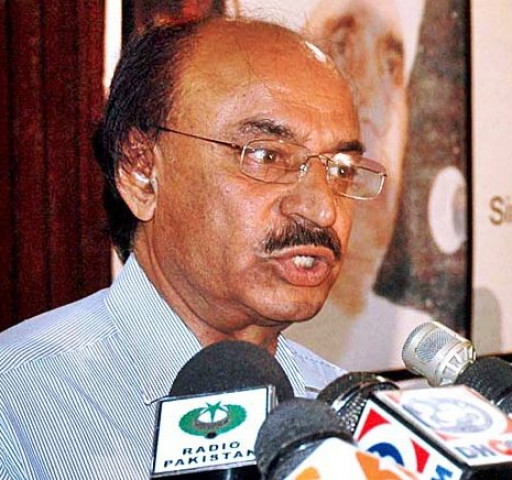Implementing Article 25A: Khuhro promises free and compulsory education, once again
Edu minister was speaking at session to review Sindh Education Sector Plan.

On Friday, the provincial education minister was speaking at the concluding session of the four-day Joint Education Sector Review to assess the progress in the implementation of Sindh Education Sector Plan (SESP) 2014-18. PHOTO: APP
On Friday, the provincial education minister was speaking at the concluding session of the four-day Joint Education Sector Review to assess the progress in the implementation of Sindh Education Sector Plan (SESP) 2014-18.
The lengthy deliberations to take the SESP beyond mere words were organised by the Sindh education department's Reform Support Unit (RSU), along with the Global Partnership for Education and United Nations Children's Fund — the implementation partners in the SESP.
"To be on the positive side, I can say that the province has, for the first time, the Sindh Education Sector Plan explaining what we are supposed to do in the next five years," said Khuhro.

He accepted, however, the issues with implementation in a country that has already witnessed a plethora of educational laws and policies. "We keep making laws but there has always been a problem of implementation," Khuhro admitted. "This time around, we will make sure to not repeat the mistakes of the past and take the implementation part as our collective responsibility."
The province does have the infrastructure available as well as the students, who along with their parents await the education department to come up and deliver, he said. However, when it comes to educational infrastructure, decades of poor planning and management has resulted in a pyramid-like structure, comprising 2,336 middle schools, 1,752 secondary and 294 higher secondary schools to inconceivably cater for the students studying at a total of 42,341 primary schools, he added.
"To break this pyramid, we need to upgrade the functional primary schools with more rooms and facilities for post-primary classes so that children run to their schools instead of running out of them," he said, adding that this endeavour to make the schools better places to learn and grow will require more budgetary allocations.
"Surprisingly, we keep talking about Rs135 billion budget for the education department but all this money goes to salaries and operational expenses," he pointed out, adding that merely Rs10 billion to Rs15 billion are allocated for development. "The budgetary allocations need to be rationalised and given priority over other measures for improvement," he said.
"We have a dream and we do want to improve [the public education system] but we also need to realise that the betterment cannot be achieved at the spur of the moment."
Earlier, Ghulam Nabi, senior programme manager at RSU, explained that the SESP covers all levels of education from early childhood education to higher secondary education. The plan, he added, defines policies, strategies and programme priorities for the next five years in a number of key areas, including governance and accountability, non-formal education, teacher education, curriculum and assessment, school infrastructure, and financing issues.
While talking about the key interventions being undertaken under the SESP, Ghulam Nabi said that their target is to increase enrolment in early childhood education classes from 32 to 45 per cent by the year 2018. "Achieving these targets will mean increasing the overall literacy rate from 59 per cent to 70 per cent by 2018," he added.
Dr Euphrates Gobina, Unicef head of education in Pakistan, acknowledged the SESP as an opportunity to re-evaluate the key issues pertaining to education in the province. She also stressed the importance of political commitment and accountability when it comes to implementation.
Global Partnership for Education's country lead Ed Lamont suggested the education minister hold the SESP implementation review session annually.
Published in The Express Tribune, February 14th, 2015.



















COMMENTS
Comments are moderated and generally will be posted if they are on-topic and not abusive.
For more information, please see our Comments FAQ